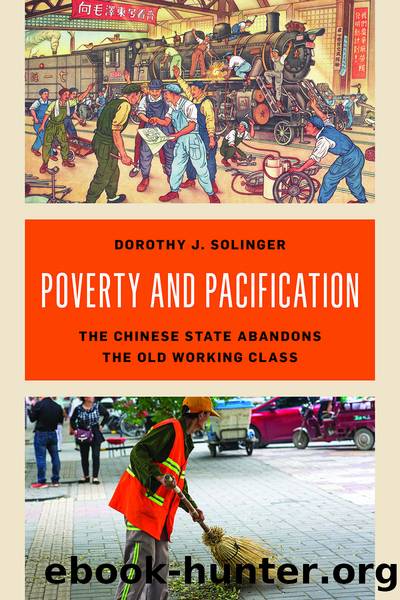Poverty and Pacification by Dorothy J. Solinger

Author:Dorothy J. Solinger
Language: eng
Format: epub, pdf
Publisher: Rowman & Littlefield Publishers
Published: 2022-02-04T00:00:00+00:00
Pacifying/Policing as Prod to Welfare
Christian Aspalter considers the hope of instilling political stability and peace in society, along with economic growth, to be two distinct regime goals driving social policy in East Asia.49 Relatedly, Alex Segura-Ubiergo contends that many Latin American countries introduced social legislation to control mobilized labor movements, citing Chile and Argentina as instances.50 In this same vein, Barrientos remarks that this impulse to appease opponents and silence troublemakers frequently feeds plans of social protection.51 In the welfare literature, China and the United States are two outstanding cases in which leadersâ concerns over possible loss of state control owing to popular opposition and disorderâespecially at times of massive unemploymentâhave disposed them to design projects that distributed allowances to the needy.
To begin with the United States, Frances Fox Piven and Richard A. Cloward suggest that Franklin Rooseveltâs angling for the Democratic Party presidential nomination in the midst of the Great Depressionâduring which millions of unemployed were clogging the roads in protestâsparked his bond with the unemployed and others in need. Among the raft of new policies his speeches pledged, a major one entailed the federal government taking on responsibility for relief where states had failed to execute their own programs. According to this reasoning, Rooseveltâs storied New Deal program was born out of electoral considerations.52 But âturmoilââin reference to the laid-off thronging the streets and clamoring for helpâwas, these authors bluntly judge, the prompt that produced the subsidies and aid dispensed during Rooseveltâs administration. Piven and Cloward also point out that, as the upheaval calmedâeven in the face of persisting and stubbornly elevated unemploymentârelief was cut back. An apt quotation establishes what they term âthe moral pointâ: âA placid poor gets nothing but a turbulent poor sometimes gets something.â53
Appraising procedures in more recent times, Joe Soss and his co-authors attest that programs billed to benefit the poor in the United States have as a major purpose limiting disruptiveness and making the indigent âmore manageable.â54 Andrea Campbell agrees, arguing that assistance for the poor can be used as a kind of punishment, as in the case of supplemental social insurance, which condemns its recipients to the most meager level of subsistence imaginable.55 Sanford Schram, commenting on the aftermath of the 2008â2009 Great Recession in the United States, holds that the working class and the poor, who had already suffered from this setback, were further disciplined by the state for their inability to manage in an economy that offered them no decent placeâthat is, they were forced to labor in precarious, substandard jobs just to stay barely nourished.56
In like vein, both administrators and policymakers in China explicitly instituted, assess the success of, and defend the dibao in large part in light of its role in quieting social disorder. They have specifically pointed to its function in appeasing the tens of millions of laid-off workers whose jobs were terminated at one stroke without warning. Patricia Thornton contends that the Communist Party handles those on the âlower rungsâ of society with surveillance and âpreemptive cum coercive strategies of control.
Download
Poverty and Pacification by Dorothy J. Solinger.pdf
This site does not store any files on its server. We only index and link to content provided by other sites. Please contact the content providers to delete copyright contents if any and email us, we'll remove relevant links or contents immediately.
The European Opportunity by Felipe Fernández-Armesto(568)
The European History Highway: A Guide to Internet Resources by Dennis A. Trinkle Scott A. Merriman(534)
Morgan Kaufmann Digital Watermarking and Steganography by Ingemar Cox Matthew Miller Jeffrey Bloom Jessica Fridrich Ton(528)
The Seven Wonders of the Ancient World by Michael Denis Higgins(518)
Hyperculture by Byung-Chul Han(501)
European Security in a Global Context by Thierry Tardy(501)
European Security without the Soviet Union by Stuart Croft Phil Williams(501)
The Routledge companion to Christian ethics by D. Stephen Long Rebekah L. Miles(496)
Get Real with Storytime by Julie Dietzel-Glair & Marianne Crandall Follis(442)
Hudud Al-'Alam 'The Regions of the World' - a Persian Geography 372 A.H. (982 AD) by V. V. Minorsky & C. E. Bosworth(436)
Gorbachev And His Generals by William C. Green(427)
Tibetan Studies in Comparative Perspective by Chih-yu Shih Yu-Wen Chen(426)
Governance, Growth and Global Leadership by Espen Moe(417)
How Languages Are Learned 5th Edition by Patsy M Lightbown;Nina Spada; & Nina Spada(405)
CliffsNotes on Fitzgerald's The Great Gatsby by Kate Maurer(398)
The Oxford History of the World by Fernández-Armesto Felipe;(388)
The Egyptian Economy, 1952-2000 by Khalid Ikram(376)
Oral Poetry and Narratives from Central Arabia: The Poetry of Ad-Dindan : A Bedouin Bard in Southern Najd (Studies in Arabic Literature, Vol 17) (English and Arabic Edition) by P. M. Kupershoek P. Marcel Kurpershoek(365)
The Oxford Handbook of the Incas by Sonia Alconini(364)
